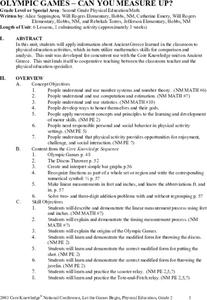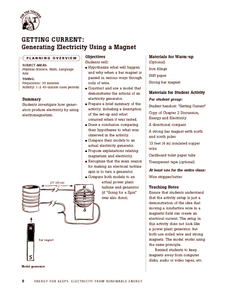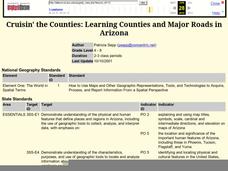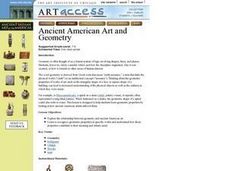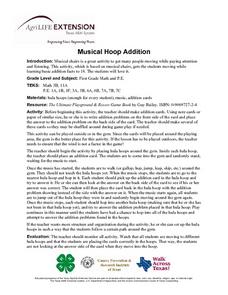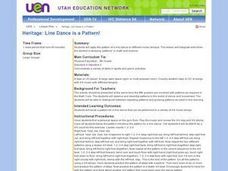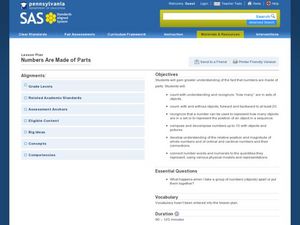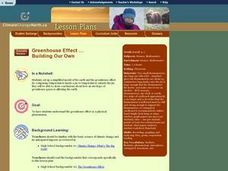Ohio Department of Education
Actions with Fractions: Adding and Subtracting Fractions with Common Denominators
Fourth graders develop a conceptual understanding of fractions and begin to add and subtract fractions with like denominators. Included is a worksheet to assess readiness and a teacher's checklist showing class understanding at a...
Curated OER
Olympic Games - Can You Measure Up?
Students complete 6 units to learn about Ancient Greece and the Olympic games through physical education activities as well as math activities. In this Ancient Greece lesson, students complete multiple activities in 6 lessons including...
Curated OER
Shipwreck Alley
Students examine the different types of vessels used in commercial shipping. In this commercial shipping lesson students apply force and motion to problems of marine safety.
Curated OER
Science Inquiry Lesson: Mapping Project
Students explore the methods of creating maps. They create a map of Animas River Park using a compass and measuring tape, develop a single map from the team map sections, and devise another map of the Animas River Park using a GPS unit.
Teach Engineering
Measuring Viscosity
Groups use a marble to determine the viscosity of household fluids. The procedure calls for pupils to measure the amount of time it takes a marble to fall a specified distance in the fluids. Using unit conversions and algebra, the teams...
Teach Engineering
Alloy the Way to Mars
Future engineers test different alloys to determine the specific strength of each one. Based on the results, they make a recommendation to NASA on which alloy to use on engines for spacecraft.
Weber State University
The Sun and the Seasons
Why is there more daylight in June than in December if you live above the equator? How does the angle of sunlight shift throughout the year? Answer these questions and more with an interactive article about the sun, its path through the...
Energy for Keeps
Getting Current: Generating Electricity Using a Magnet
Give your class a magnetic charge with this creative experiment designed to teach emerging scientists about electromagnetism. Pupils construct a model that demonstrates the function of an electrical generator and test this creation in a...
Curated OER
Cruisin' the Counties: Learning Counties and Major Roads in Arizona
Students examine Arizona counties and use the themes of location and movement to develop an Arizona map.
Curated OER
Science in baseball
Sixth graders examine how science is used in everyday activities, such as baseball.
Curated OER
Ancient American Art and Geometry
Students explore the relationship between geometry and ancient American art. They see how to recognize geometric properties in specific works and explain how these properties contribute to their meaning and artistic merit.
Curated OER
Finding Your Pulse Rate
Fifth graders demonstrate how to find their pulse and count the beats after a certain amount of time. In cooperative pairs, 5th graders use a stopwatch to keep track of their partner's heart rate in seconds. Pairs make a graph from their...
Curated OER
Musical Hoop Addition
Musical chairs is a great activity to get children moving while still paying attention and listening. This activity, which is based on musical chairs, gets students moving while learning basic addition facts. They hop from hoop to hoop...
Curated OER
Vectors
High schoolers listen to a lecture and complete a number of problems as they go. There are a variety of examples given and they are guided through the problem solving steps for each of the real-world scenarios regarding the purpose of...
Curated OER
Shamrock Spelling
Review spelling skills by learning about the history of shamrocks. Learners use a picture of a shamrock to practice spelling three letter words. One letter goes on each shamrock leaf. It is a way to engage your kinesthetic learners.
Curated OER
Viral Marketing
What is "viral marketing" and how does it relate to mathematics? Young mathematicians use exponential functions to develop a mathematical model for a business advertising campaign. Learners then see how their campaigns increase...
Curated OER
Heritage: Line Dance is a Pattern!
Line dancing is the repeating of a pattern of steps, done to music. Teach youngsters how to line dance and they won't feel so awkward when they grow up. Let them experiment with creating their own patterns and teaching their classmates....
Curated OER
Sequencing From Close To Far
Students explore how objects stay the same size and only "look" like they change when closer are farther from the object. They sequence aerial photos and satellite images from closest to farthest.
Curated OER
You Are What You Eat!
Fourth graders discover the nutritional needs of their bodies. Using a database, they research how nutrition affects their learning capabilities. They take the food they eat on a daily basis and discover its nutritional value. They...
Curated OER
The Hudson's Ups and Downs
Even rivers have tides. Older elementary schoolers will discuss the Hudson River and how weather, water craft, and the ocean cause tidal fluctuation. They will examine a series of line graphs that depict tidal fluctuation, then analyze...
Pennsylvania Department of Education
Numbers Are Made of Parts
Children play with barnyard animal cards to practice composing and decomposing numbers. With their "secret number" of animal cards in a cup, they shake and spill them onto a barn story board, counting how many animals fall in the barn...
Curated OER
Scaling Up Art
Students measure a sculpture of a human and measure other students. They determine the average size of humans and create a life size image of the sculpture. They work with percentages as they create the images.
Curated OER
Greenhouse Effect ...Building Our Own
Young scholars explore the greenhouse effect. They set up a simplified model of the earth and the greenhouse effect. Students compare temperatures inside a jar to temperatures outside the jar. Pupils collect information and create a line...

